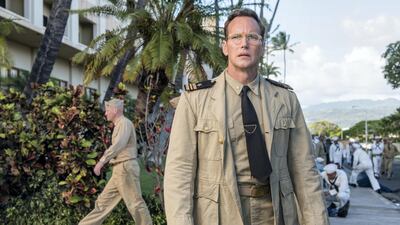Roland Emmerich's Midway may be a simplified version of one of the most decisive naval battles of the Second World War, but it is tastefully done.
The film is focused on the Battle of Midway, which took place from June 4-7, 1942, six months after Japan attacked Pearl Harbour. Unlike the 2001 film Pearl Harbor, which served mostly as an excuse for director Michael Bay to write a love story with strands of historical narrative woven in, Midway sticks to the facts and provides an accurate depiction of this period.
Japan's attack on Pearl Harbour, Hawaii, off the west coast of the United States, in December 1941, prompted America's entry into the war. But Japan wasn't through with its quest to eliminate the US as a strategic power in the Pacific, and planned to lure its aircraft carriers into a trap and occupy Midway, a US territory near the western end of the Hawaiian archipelago, as an extension of its defensive perimeter.
The film focuses on the events leading up to this mission, which was thwarted in the end when Washington learnt of the attack and planned an ambush of its own. With such an incredible showdown forming the premise of the film, some epic battle scenes were expected.
It was fortunate, then, that Emmerich was at the helm. The German director is rather adept at producing such films, having given the world Independence Day, Godzilla and The Patriot, and he doesn't disappoint in Midway.
While Emmerich can't resist serving up another healthy dose of American patriotism, he also shows a human side to the Japanese. His sympathetic depiction of Admiral Yamamoto (played by Etsushi Toyokawa), portraying him as a conscientious leader, puts Japanese culture in an honourable light. He is also careful to show the mutual respect the warring nations had for each other, making it a slightly different film from the rest of his oeuvre.
Nonetheless, the film is told from the US perspective, so we are front and centre as the Americans ambush the Japanese after intercepting their messages and planning a counterattack.
By air, maverick pilots Lt Richard Best (Ed Skrein) and Lt Commander Wade McClusky (Luke Evans) played their roles convincingly, going into battle knowing they had only slim chances of survival.
Powerful performances are also given by Nick Jonas as machinist Bruno Gaido, and Patrick Wilson as Edwin Layton, the intelligence officer who intercepted and deciphered the Japanese messages that alerted Washington to the coming attack. It's a bumper cast rounded out by Woody Harrelson as Admiral Chester Nimitz, and Dennis Quaid as Vice Adm William Halsey, who lend their gruff, veteran acting chops in stirring performances.
However, we're not only presented with a tough guy parade of why the US is the greatest nation on Earth here. Emmerich does well to show Yamamoto and his deputies' – Admiral Tamon Yamaguchi (Tadanobu Asano) and Vice Admiral Chuichi Nagumo (Jun Kunimura) – efforts in serving their country with nobility.
More than 2,000 Japanese and 300 Americans died in the Battle of Midway. The director stays true to the facts and doesn't water down the story for the sake of drama, unlike Pearl Harbor, which trivialised the topic with romance.
While Emmerich tried to humanise the American soldiers by creating a subplot that focused on their families, it fails to add much to the plot.
Best's wife Anne (Mandy Moore) and the other female characters simply distract from the matter at hand, in only a token attempt to balance the war scenes.
It seems a shame given that pivotal moments in the battle, which have been debated ever since, such as Nagumo's decision to counterattack instead of defend against the American ambush, were sadly sacrificed for a simple plot.
Considerable time in the two-hour, 18-minute film is also devoted to the Doolittle Raid, the US response to Pearl Harbour, in which aircraft shelled Tokyo and other Japanese cities two months before Midway.

Despite providing some light comedic relief and the appearance of Aaron Eckhart as Gen James Doolittle, it seemed out of place and redundant. Emmerich should have left most of this, as well as the irrelevant personal scenes, on the cutting room floor to make way for more important scenes such as Nagumo's story. Nonetheless, the aerial battle scenes make up for this, with impressive visual effects and machinery, such as the bomber planes, recreated only from photographs.
Emmerich, with help from his Patriot production designer Kirk Petruccelli, is well versed in this, and effectively evokes the wartime period.
The film pays attention to detail for even the most mundane actions, such as the time it would once have taken to load ammunition, that is simply absent from modern blockbusters, and which helped to set the scene.
If you're a fan of war films, it's an entertaining watch, with notable performances from Skrein, Quaid, Evans and Harrelson in particular. Most importantly, it is not overshadowed by an irrelevant romance.
Midway is in UAE cinemas now



